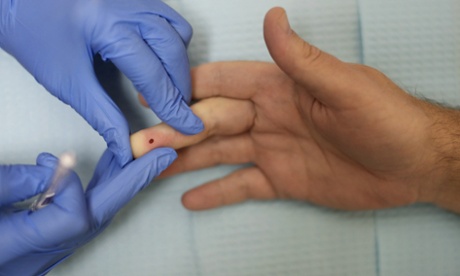Health minister Peter Dutton also announces that from July 2015 HIV drugs will be available through community pharmacies

HIV specialists have welcomed the lifting of a restriction on the sale of HIV home-tests in Australia, but say there is a danger some people may test themselves too early to get an accurate result.
As part of the government’s goal to significantly reduce HIV infections by 2020, manufacturers of HIV home testing kits can apply to Australia’s drug regulator for approval of their tests and to sell them directly to consumers.
The health minister, Peter Dutton, also announced Monday that from July next year, HIV antiretroviral drugs will be available through community pharmacies, with patients currently restricted to getting their treatments from hospital pharmacies.
There were more than 1,200 new HIV infections in Australia last year, the highest number in two decades. Up to 20% of people with HIV in Australia are unaware they have it.
A clinical nurse consultant with the HIV and communicable diseases unit at St Vincent’s hospital in Sydney, John McAllister, said easy access to testing was particularly important for hard-to-reach groups who may not normally see a doctor, such as those in rural areas.
Once people knew they had HIV, most changed their behaviour to protect other people by disclosing the condition and using condoms, he said.
But people needed to be aware it could take up to three months from when first becoming infected until the home oral-swab tests could detect the infection, he said.
“The danger is someone might test too early, test negative, and assume they’re OK when in fact they’re not,” he said.
“People with early undetected HIV infections are very infectious.”
Those who believed they had been infected within the past three months should see their doctor for one of the other kinds of HIV tests available instead.
Most people who take antiretroviral treatments as directed reduce their chance of transmitting the virus to others during unprotected sex by up to 96%. It means that ensuring people with HIV are aware they have it, are receiving treatment, and can easily access drugs is essential to preventing its spread.
Director of the Institute for Immunology and Infectious Diseases at Murdoch University in Western Australia, Professor Simon Mallal, said home HIV testing and access to HIV treatment at local pharmacies were important additions to existing prevention approaches, such as condom use.
“We need for it to be as easy as possible for someone with HIV to choose to be tested, see an expert in HIV care regularly and take HIV tablets for life,” he said.
But it was important support be available to those testing at home in case the result indicated HIV infection, he said.
“An understandable anxiety around home testing is that the patient misses out on the pre- and post-test counselling they would receive when tested in a doctor’s office,” Mallal said.
“When people test at home they may obtain a result and not have that expert advice about how to interpret it, and they could be left on their own to grapple with potentially frightening information.
“It’s very important that people are very quickly connected with an expert who can reassure them that these days, HIV is a manageable disease with the right treatment.”
It was also important that people confirm the test result with their doctor, he said.
The test is already widely available in the US – where they sell for about $40 – and includes information about a 24-hour telephone service for support if a positive result is indicated.
